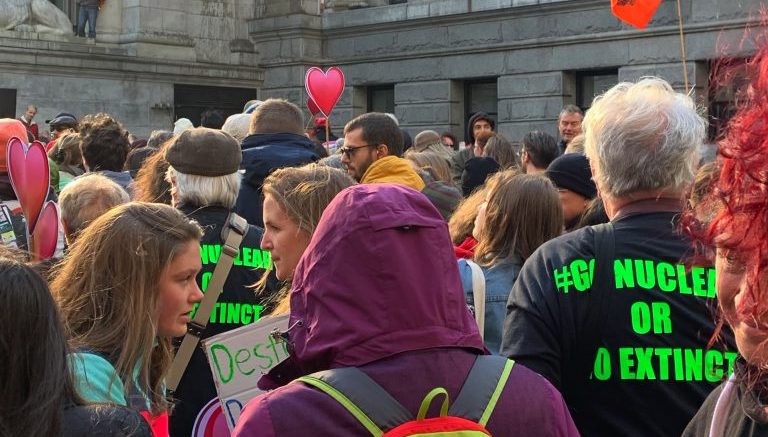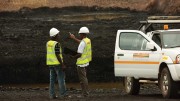In December, Time named Swedish climate activist Greta Thunberg its person of the year — the youngest person ever awarded the accolade in the magazine’s nearly 100-year history. The 17-year-old from Stockholm embodies “the power of youth” Time said, and has inspired millions to stand up and demand action against climate change.
Shortly after Time put her on the cover, U.S. President Donald Trump tweeted: “So ridiculous. Greta must work on her anger management problem, then go to a good old-fashioned movie with a friend! Chill Greta, Chill!”
It’s not the first time the teenager has gotten under the skin of one of the world’s populist presidents. Last month, President Jair Bolsonaro of Brazil called Thunberg a pirralha — Portuguese for “little brat” — after she tweeted that Indigenous people in the country were “literally being murdered for trying to protect the forest from illegal deforestation.” Her tweet followed the targeted killing of two people in the Cana Brava Indigenous reservation in Maranhao state.
“Greta has been saying Indians have died because they were defending the Amazon,” Bolsonaro told reporters on Dec. 10. “It’s amazing how much space the press gives this kind of pirralha.”
For his part, Bolsonaro has vowed to open up more of the Amazon rainforest to mining, logging and farming. Between August 2018 and July 2019, deforestation in Brazil’s part of the Amazon jumped 30% to 9,762 sq. km — its highest level in more than a decade, according to Brazil’s INPE space research agency. Last year 80,000 fires, most attributed to deforestation, were documented in the Amazon basin.
Increasing temperatures, rising seas and catastrophic fires were the key talking points at January’s World Economic Forum in Davos, where Trump and Thunberg spoke to the world’s rich and powerful.
In his speech, Trump barely mentioned environmental issues or climate change and instead took a swipe at activists, describing them as “the heirs of yesterday’s foolish fortune-tellers.”
“They predicted an overpopulation crisis in the 1960s, a mass starvation in the 1970s and an end of oil in the 1990s,” Trump declared. “This is not a time for pessimism. Fear and doubt is not a good thought process.”
Thunberg called on companies, banks, institutions and governments to stop all fossil fuel investments, end all fossil fuel subsidies, and “immediately and completely” divest from fossil fuels.
This time it wasn’t a president who criticized the climate campaigner, it was U.S. Treasury Secretary Steven Mnuchin: “After she goes and studies economics in college, she can come back and explain that to us,” he told reporters during a press conference at the forum.
It’s absurd how three aging white men — Trump (73 years old), Bolsonaro (64) and Mnuchin (57) — can ridicule a teenager.
If climate-change denying politicians don’t think they need to heed the science, maybe they should start listening to global business elite like Laurence Fink, founder, chairman and CEO of BlackRock, the world’s top asset manager with nearly US$7 trillion under management. In his 2020 letter to CEOs of the world’s largest companies, Fink warned that “every government, company and shareholder must confront climate change.”
“The evidence on climate risk is compelling investors to reassess core assumptions about modern finance,” he wrote. “We will be increasingly disposed to vote against management and board directors when companies are not making sufficient progress on sustainability-related disclosures and the business practices and plans underlying them.”
BlackRock plans to divest from companies that generate more than 25% of their revenues from thermal coal production by mid-2020. It’s a good first step. But the threshold is still too low, and diversified mining companies like Glencore and others in the coal business like Anglo American and BHP Billiton can slip under that cap.
Glencore CEO Ivan Glasenberg recently defended the company’s coal exposure, stating on a Dec. 3 conference call that coal “has a future” and makes a lot of money. “It’s something we believe is good for the company going forward,” he said.
“We did do the coal cap — we kept our coal production at 150 million tonnes — and that’s what we have done to satisfy the investors, and that’s where we are right now.”
That just isn’t good enough. Last year was the second-warmest year on record after 2016, according to researchers at the National Aeronautics and Space Administration and the National Oceanic and Atmospheric Administration.
The fires in Australia underscore the urgency. Fuelled by searing heat and record drought, the flames ravaging that country have incinerated more than 106,000 sq. km, killing at least 33 people and more than a billion native animals — and yet Australian Prime Minister Scott Morrison refuses to acknowledge climate change as a key factor and remains a big supporter of fossil fuels like coal.
“In a rational world, the burning of Australia would be a historical turning point … But the world isn’t rational,” Paul Krugman of the New York Times wrote in a recent column. The headline? “Australia shows us the road to hell.”





Be the first to comment on "Editorial: Sustainability tops discussions at Davos"